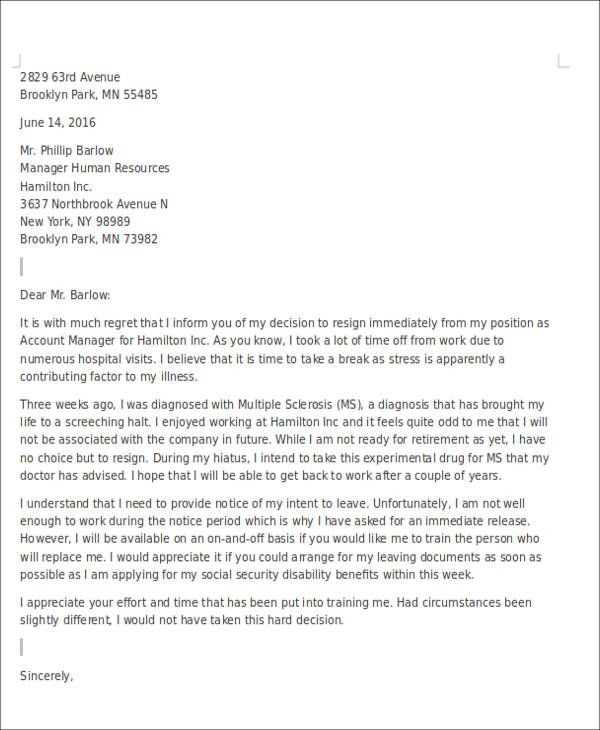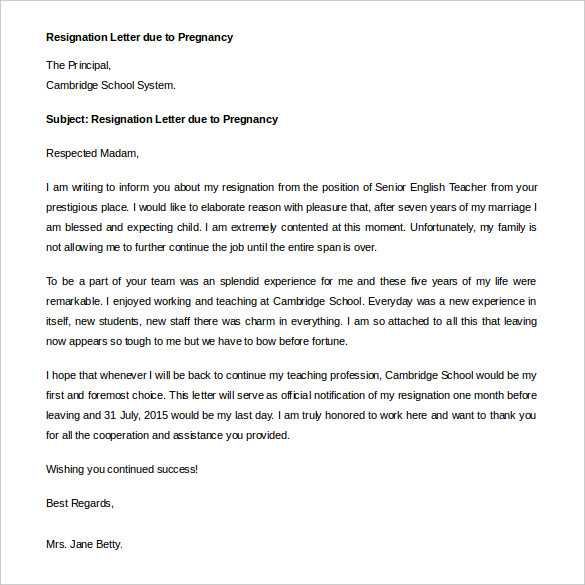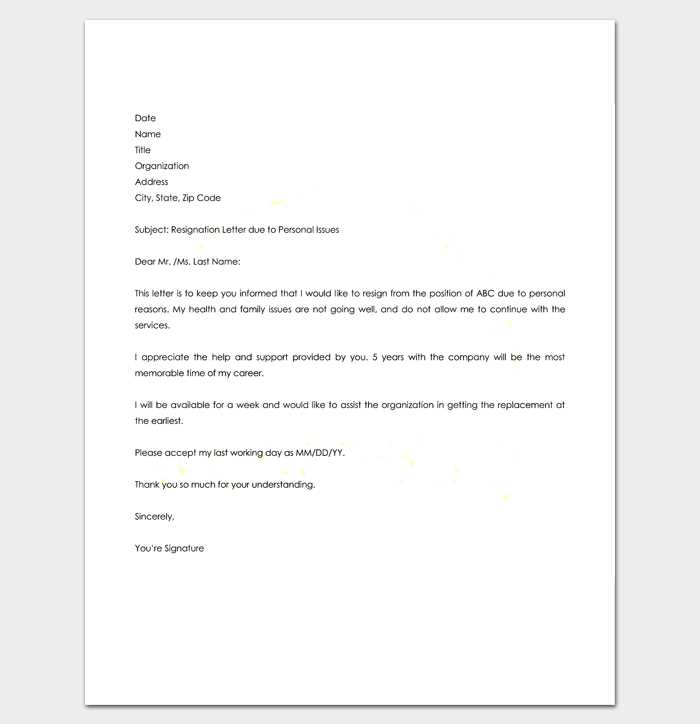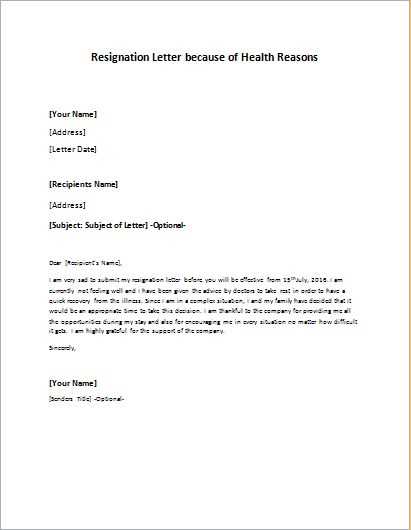Resignation Letter Template for Health Reasons

When personal circumstances, particularly related to well-being, require a person to step away from their current job, it’s crucial to approach the situation with both clarity and respect. Expressing this decision in writing can help ensure that your departure is smooth and considerate, leaving a professional impression. Crafting a thoughtful note is important, whether the break is short-term or permanent.
In these cases, it’s essential to express your need for a break from work while showing appreciation for the time spent with the company. Being honest about your condition, without going into too much detail, helps to maintain a balance between privacy and transparency. Approaching the subject with empathy can also make this process easier for both you and the organization.
This section will guide you through the necessary steps for drafting a respectful and well-crafted communication when personal matters are the driving factor behind your decision to leave the workplace. Whether you’re leaving temporarily or for an extended period, having the right words can make all the difference in preserving professional relationships.
Understanding the Need to Step Away for Medical Reasons
In some situations, individuals may find it necessary to temporarily or permanently leave their job because of physical or mental challenges. When these personal circumstances arise, it’s important to manage the communication professionally and thoughtfully. The decision to stop working for health-related matters should be conveyed clearly, balancing the need for privacy with respect for the company’s needs.
In this context, transparency and professionalism are key. While you don’t need to go into specific details about your condition, providing a concise explanation is often helpful. Employers will appreciate the clarity, and it can also help in finding a smooth transition. Here’s a look at the common approach to this kind of situation:
| Key Considerations | What to Include |
|---|---|
| Clear Communication | Explain the necessity of the decision briefly, without revealing too much personal information. |
| Professional Tone | Maintain respect and professionalism throughout your message. |
| Appreciation | Express gratitude for the time spent working with the team and the opportunities provided. |
| Transition Details | If applicable, offer assistance in the transition process or suggest next steps. |
Why Medical Issues May Lead to Leaving a Job
In certain situations, individuals may find themselves needing to step away from their work due to personal struggles involving their well-being. Whether these challenges are short-term or long-term, the decision to pause or end one’s professional journey can arise when the physical or mental toll becomes too much to manage alongside job responsibilities. Understanding why this might happen is key to ensuring clear communication and smooth transitions during such difficult times.
Temporary or Permanent Breaks
Sometimes, individuals face circumstances that require a temporary break from work to focus on recovery. This might involve short-term rest or medical treatments that hinder a person’s ability to perform their job. In other cases, the situation might require a permanent break, especially when long-term care or ongoing management is needed. Regardless of the length of time involved, these personal matters can ultimately interfere with job performance, prompting the need for a change.
Maintaining Personal Well-Being
When the demands of a job conflict with the necessity for proper care, the individual’s well-being becomes the priority. Constant stress, physical strain, or mental fatigue can impact not only personal health but also job performance. In such cases, stepping away from work allows individuals to focus on recovery and ensure they can return to their professional life when they are ready. This decision reflects the need to strike a balance between personal care and professional duties.
Key Components of a Medical-Related Departure
When an individual decides to step away from their job due to personal challenges involving well-being, there are several important elements that need to be addressed in the message. These components ensure that the communication is clear, professional, and respectful, making the process smoother for both the individual and the organization. Crafting a thoughtful and concise message can help maintain positive relationships during this time.
Essential Elements to Include
- Clear Explanation: A brief but clear statement explaining the decision to step away, without going into excessive personal detail.
- Appreciation: Acknowledging the opportunity and expressing gratitude for the time spent with the company.
- Transition Plan: If possible, offering assistance in transitioning your responsibilities or suggesting a plan for covering your tasks.
- Professional Tone: Maintaining a respectful and professional tone throughout the communication to leave a positive impression.
Additional Considerations

- Timing of the notification: It’s important to give enough notice to allow for a smooth transition, depending on the urgency of the situation.
- Offer support: If able, suggest ways to help with finding a replacement or ensuring tasks are completed during your absence.
How to Show Appreciation in Your Communication
When stepping away from a role due to personal circumstances, it’s important to express gratitude for the experiences and opportunities provided by the company. Showing appreciation helps leave a positive impression and maintains good relationships with colleagues and employers. A thoughtful acknowledgment of the time spent in the role can make a significant difference during such a sensitive transition.
Ways to Express Gratitude
- Acknowledge Support: Thank your employer for the understanding and support provided throughout your time at the company, especially during challenging moments.
- Appreciate Growth Opportunities: Highlight the skills and experience you gained while working with the team, which have contributed to your personal and professional growth.
- Value Teamwork: Mention the positive experiences and collaborations you had with colleagues, emphasizing how teamwork enhanced your role.
Crafting a Thoughtful Message
It’s essential to be sincere and specific in your appreciation. Tailor your message to reflect your personal experiences, and avoid general or overly formal expressions. A well-crafted, heartfelt acknowledgment can leave a lasting positive impression, ensuring that you maintain professional connections even after your departure.
Maintaining Professionalism in Medical-Related Departures

When stepping away from a job due to personal challenges involving well-being, it’s important to maintain a professional demeanor throughout the process. A thoughtful, respectful approach not only ensures a smooth transition but also preserves the relationship with the organization. Proper communication during this time reflects your commitment to professionalism, even in difficult circumstances.
Clear and Respectful Communication
Ensure that your message is clear, concise, and respectful. While it’s important to provide a valid explanation for your decision, avoid going into excessive detail about your condition. Maintaining privacy while being transparent about the necessity of the decision demonstrates maturity and professionalism.
Offer Assistance and Smooth Transition
Even during challenging times, showing that you care about the success of the team is important. Offering help with the transition, whether it’s by training a successor or providing detailed instructions for ongoing tasks, can ease the process for everyone involved. This will leave a positive impression and show that you remain committed to the success of the organization, despite stepping away.
Other Options Before Stepping Away for Medical Concerns
Before making the final decision to leave your position due to personal well-being, it’s important to consider other available options. There may be ways to adjust your work situation to accommodate your health challenges without completely stepping away from your role. Exploring alternatives can help you maintain your professional life while managing your condition.
Flexible Work Arrangements
- Remote Work: If your job allows, consider discussing the possibility of working from home to reduce physical strain or manage mental stress.
- Reduced Hours: Requesting a temporary reduction in hours can provide the necessary time for recovery while allowing you to stay employed.
- Job Sharing: Explore the option of sharing responsibilities with a colleague to lighten the workload and provide you with more time to rest.
Temporary Leave Options
- Short-Term Disability Leave: Many companies offer short-term disability benefits that allow you to take time off without losing your job.
- Medical Leave of Absence: If available, this type of leave allows you to focus on recovery while preserving your position for when you are ready to return.
Before making a permanent decision, it’s worth discussing these options with your employer to see if there is room for flexibility. This way, you can ensure the best outcome for both your personal well-being and your professional responsibilities.
Sample Template for a Health-Driven Departure
When it becomes necessary to step away from a role due to personal well-being, it’s important to communicate this decision clearly and respectfully. A well-crafted message can help maintain professionalism and preserve relationships with the company. Below is an example of how such a communication could be structured, ensuring it reflects the situation without being overly detailed.
Example Communication Structure

Subject: Notice of Departure for Personal Well-being
Dear [Manager’s Name],
I am writing to formally inform you of my decision to step away from my role as [Job Title] at [Company Name], effective [Date]. After careful consideration, I have come to the conclusion that focusing on my well-being is essential at this time.
Working with [Company Name] has been a rewarding experience, and I am grateful for the opportunities and support I have received. I truly appreciate the collaboration with my colleagues and the valuable lessons I have learned during my time here.
If possible, I am happy to assist with the transition in any way I can, whether that involves training a replacement or providing documentation for ongoing projects. Please let me know how I can be of help during this process.
Thank you once again for your understanding and support. I wish [Company Name] continued success, and I hope our paths cross again in the future.
Sincerely,
[Your Name]
Important Notes to Keep in Mind
Be concise: Focus on the necessary information and avoid oversharing personal details.
Express appreciation: Acknowledge the support and opportunities provided by the company, even if the decision is a difficult one.